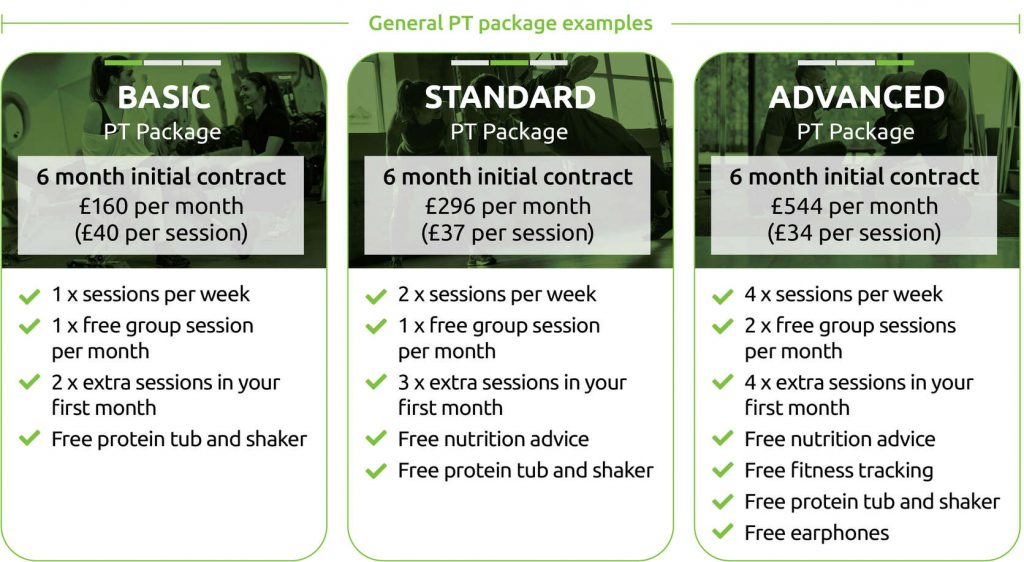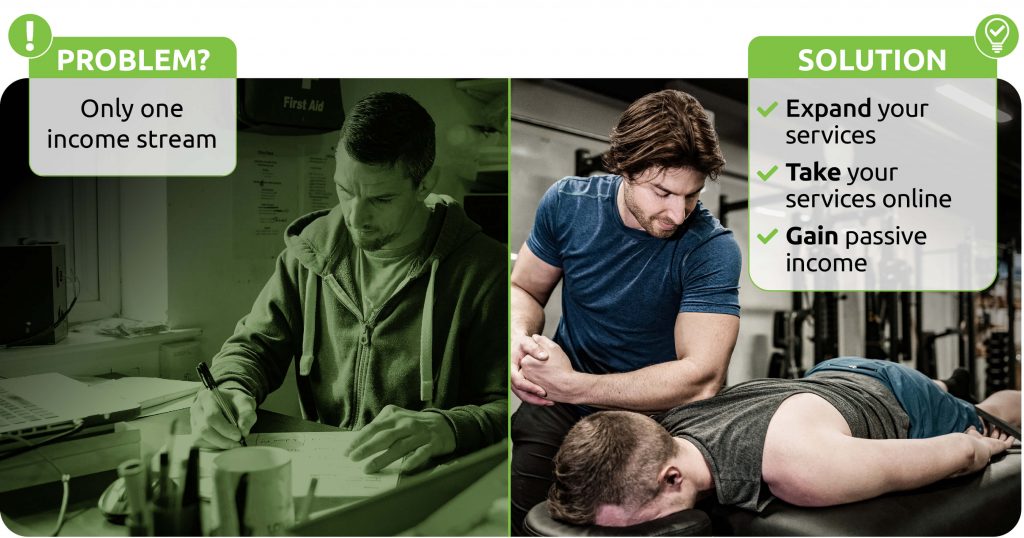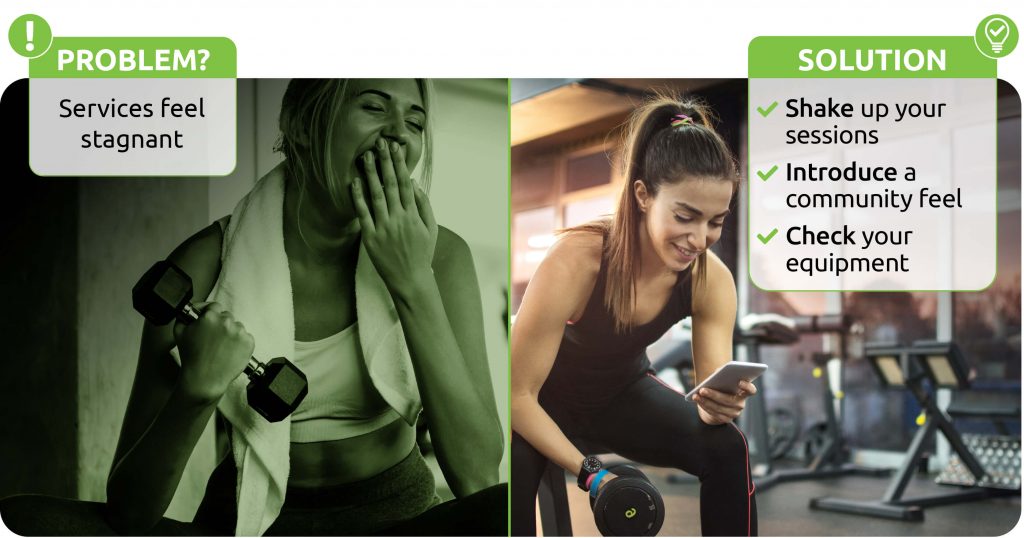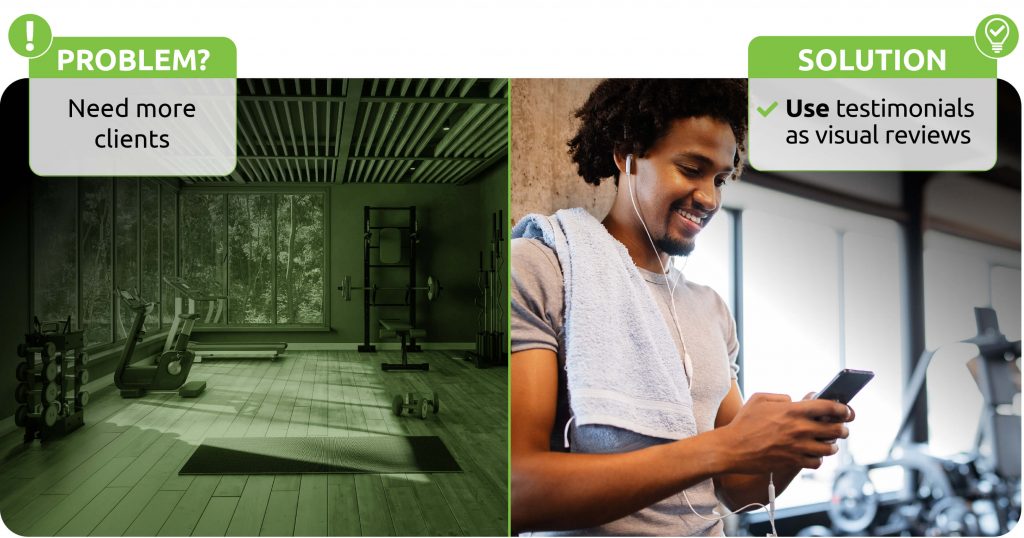68% more people signed up for a gym member policy with Insure4Sport in January 2022 than during the festive season.
Our data also shows there were 60% more gym members in November 2022 compared to November 2021, suggesting the fitness industry is continuing to pick up after the impact of COVID-19.
That being said, the current cost-of-living crisis is bound to concern many personal trainers running their own businesses.
We decided to put together a guide for recession-proofing your personal training business and making the most of the January rush.
1. Revamp your personal training packages

The December lull in business is the perfect time to consider your pricing structure.
Many PTs opt for block sessions that clients pay for in advance, typically ending after 8-12 weeks. While this works for some, it presents two main issues: poor client retention, leading to income gaps.
There’s a more lucrative structure for PTs who want to save time signing up new clients by keeping the ones they’ve got and eradicating those unstable times when they’re in between clients.
As you can see, this involves signing them up for a monthly direct debit over a 6-month period, which guarantees your income.
Learn more in our full guide on how to design PT packages to boost your business.
2. Know your unique selling point

This is important if you want to stand out against other PTs during the January rush.
You might already know this, but it does not harm to re-think the centre of your business.
If you’ve been coaching general fitness clients up to now, you may want to consider targeting a niche market to set yourself apart from competitors, build your authority, and gain more clients in the long run.
There are many benefits to establishing yourself as an expert within a niche and dominating it within your local area or even as an online PT.
Check out this article for the best niche fitness markets personal trainers can take advantage of.
Other unique selling points could include:
- offering specialist services
- a unique teaching style
- certain brand values
You could offer sports massage therapy alongside personal training, for example, or discounted sessions during off-peak hours to accommodate elderly clients or students—there are many ways you can communicate your brand identity to cut through the noise.
3. Focus on your marketing strategy

Knowing your target audience is an essential foundation for your marketing strategy.
Whether you’re targeting a niche fitness market or clients of a certain age group, education status, or financial background, knowing who you’re speaking to through your marketing will inform everything you do.
It’s also a good idea to consider whether you train clients in-person, online, or a combination of both.
If you’re targeting elderly clients in person, for example, you may want to visit local areas or businesses and hand out leaflets and establish connections for referrals.
However, if you’re targeting online clients aged 25-40, it makes more sense to build a following on Instagram and post valuable content that resonates with this audience, along with a strong CTA in your bio.
It would help if you launched discounts for January to get as many new clients signed up as possible, considering our discovery that at least 68% more individuals are interested in improving their fitness during this time.
You could use our PT packages example above and give them 20% off for an initial 6-month contract.
It’s also a good idea to run ongoing discounts this way, but instead of naming them ‘New Year discount’, for example, call them ‘Spring discount’, and so on.
Another key to a successful marketing strategy is to use SMART goals to measure the growth of your brand awareness. You can apply this to social media marketing or however many clients you sign up via in-person methods.
This is a great way to measure what works and what doesn’t and learn how to adapt your strategy accordingly. It’s also a great way to ensure your business is growing, thanks to your efforts.
Try some of these 25 personal training marketing ideas to get started.
4. Consider additional income streams

The lull over the festive period is a great time to learn new skills that could skyrocket your business in the new year.
You could take extra courses in fitness, such as sports massage or sports nutrition, to build on your expertise and justify to clients why they should hire you over other personal trainers.
It’s also great to refer clients from one side of your business to another, boosting your retention.
For example, an injured client may need a sports massage therapist to help them get back on their feet and a personal trainer to help them regain their fitness. You could provide both services to grow your income.
Another option is to take your services online. If you don’t have the time or energy to run live sessions, you could collate a library of exercise sessions and nutrition plans for your target client base.
Using basic SEO and targeting niche-specific keywords through your website will make a difference. Even a few online clients subscribing to your exercise library can significantly increase your income alongside training clients in person.
Here’s our guide on becoming an online personal trainer to give you a few pointers.
There are many passive income options outside of creating an online library—get inspired with these 7 sources of passive income for personal trainers.
5. Remember your existing client base

It’s easy to feel a little stuck in a rut after the strain of the past few years. There’s never any harm in evaluating your current services and getting creative with how you could improve them for your current clients in the new year.
Shaking up your sessions by planning and creating new content ahead of January is a surefire way to get your clients excited about what you can achieve together.
Try changing the format by adding tougher exercise variations to help clients see they’re progressing or throw in some previously untapped training methods, such as functional training or TRX. You should avoid allowing your sessions to feel predictable at all costs.
Software is another great way to keep your clients engaged with their fitness journey, as it’s a visual way of logging and tracking their progress.
Encourage them to upload progress photos each week and set and evaluate SMART goals with them at the end of each session.
This shows how far they’ve come through working with you whilst also drawing focus to the future, which is never a bad idea considering you want them to continue working with you indefinitely. If they’re constantly reminded of the value they’re receiving, this is much more likely.
You could also create a Facebook group where your clients can chat and compare results and encourage them to participate in competitions where the winner receives a gift or a free week of sessions.
This can help them feel like they’re part of a community rather than alone in their fitness journey outside your sessions.
This can work wonders for client retention, especially since one study found that 95% of those who started a weight-loss program with friends completed the program, compared to a 76% completion rate for those who tackled the program alone.
Giving clients small incentives for their loyalty is another proven method, such as meal prep kits, protein tubs, or coffee shop vouchers. It’s a small but effective reminder of how much you value them.
Finally, if you own a PT studio or are responsible for the equipment you use with clients, you should ensure it’s in pristine condition ahead of the new year. Make sure it’s fully functional and clean, as no one wants to pay for a personal trainer to work out with second-rate gear.
6. Establish a referral scheme

Let’s face it—putting energy into getting new clients is exhausting, especially when you’re busy trying to hit the ground running in January with many new prospective clients.
One way to fix this problem is to use your existing client base to gain new clients through a mutually beneficial referral scheme. You can free up time to gain more qualifications or strengthen your sessions.
If they bring a friend and they sign up for your services, the friend receives a discount, and the client receives a free joint session or free nutrition advice.
This creates a win-win situation as you gain a new client, and they receive something of value they usually need to pay for.
Their friend receives a discount for signing up too, so they’re unlikely to turn this down if they’re interested in personal training sessions.
You can remind your clients of the scheme during their sessions and push it on your social media channels. It’s a truly effective marketing technique that many PTs overlook.
7. Use PT testimonials to boost your business

If you’re new to personal training and have a relatively small client base, testimonials are the best way to attract new clients.
72% of customers don’t take action until they have read reviews. PT testimonials are even stronger than your average review—they give prospective clients a visual representation of the results others have achieved by working with you.
Every client has a vision for how they want to look and feel after working with a personal trainer. The more you reinforce the idea that you’re the individual to get them to their goals, the better.
Share them across your social media channels to gain interest, or ask the gym you work in if you can pin some to the noticeboard.
Don’t have any testimonials yet? Ask your clients for their permission to share their progress photos and ask them to write up a summary of the difference your sessions have made in their life. You can always offer them an incentive to do so.
Learn how to use PT testimonials to boost your business with our full guide.



